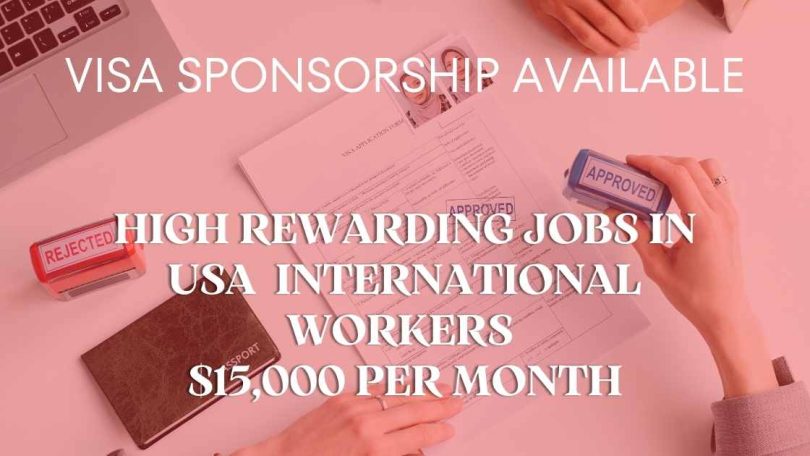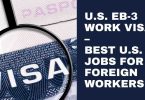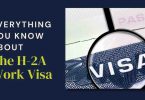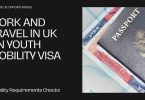Advertisements
The United States has long been a top destination for skilled workers from around the world, offering not only competitive salaries but also a pathway to a better quality of life. With an ever-growing demand for talent in various industries, the U.S. has opened its doors to skilled international workers by providing visa sponsorship opportunities.
These programs allow qualified professionals to live and work in the U.S., filling crucial roles in sectors where there is a shortage of domestic talent. For those with the right skills and experience, the U.S. offers jobs that can pay as much as $15,000 per month or more, making it an attractive option for those looking to advance their careers and achieve financial success.
This guide explores some of the high rewarding jobs available in the U.S. that come with visa sponsorship, helping skilled international workers understand the opportunities that await them.
Top Industries Offering High Paying Jobs
Several industries in the United States are known for offering high salaries, especially to skilled international workers. These industries are not only in need of expertise but also provide attractive compensation packages to attract top talent from around the world. Below are some of the top industries where you can find jobs that pay $15,000 per month or more, often with visa sponsorship opportunities:
Information Technology (IT)
Overview: The IT industry in the U.S. is booming, with a constant demand for skilled professionals in areas like software development, cybersecurity, and data science. Companies are willing to pay high salaries to attract top talent.
Advertisements
High Paying Roles: Software Engineers, Data Scientists, IT Managers, Cybersecurity Analysts.
Healthcare and Medicine
Overview: The healthcare sector is one of the largest employers in the U.S. With an aging population and increasing healthcare needs, there is a high demand for skilled medical professionals.
High Paying Roles: Physicians, Surgeons, Anesthesiologists, Medical Directors, Pharmacists.
Engineering
Overview: Engineering remains a cornerstone of U.S. industry, with opportunities in civil, mechanical, electrical, and aerospace engineering. The complexity and importance of these roles often command high salaries.
High Paying Roles: Civil Engineers, Aerospace Engineers, Mechanical Engineers, Petroleum Engineers.
Financial Services
Overview: The U.S. financial sector is robust, with Wall Street and major financial institutions leading the way. Skilled professionals in finance are highly sought after, particularly in roles that require analytical and strategic thinking.
Advertisements
High Paying Roles: Investment Bankers, Financial Analysts, Risk Managers, Hedge Fund Managers.
Legal and Law Services
Overview: The legal industry in the U.S. is known for its lucrative compensation, particularly in large law firms and specialized areas of law. Skilled international lawyers with expertise in U.S. law or international law can find rewarding opportunities.
High Paying Roles: Corporate Lawyers, Intellectual Property Attorneys, Compliance Officers, Legal Consultants.
These industries not only offer high salaries but also frequently provide visa sponsorship to attract and retain top international talent. If you have the skills and qualifications needed in these sectors, you could find yourself in a high-paying job that allows you to live and work in the United States.
Visa Sponsorship Programs
Securing a high-paying job in the United States often requires navigating the visa sponsorship process. For skilled international workers, there are several visa programs designed to allow entry into the U.S. workforce. Below is an overview of the most popular visa programs, the process for obtaining visa sponsorship, and some companies known for sponsoring visas.
Overview of Popular Visa Programs
H-1B Visa
Purpose: The H-1B visa is one of the most common visa types for skilled workers. It is specifically for professionals in specialty occupations that require a high level of expertise, such as IT, engineering, and healthcare.
Eligibility: Applicants must have a bachelor’s degree or higher in a specific field and a job offer from a U.S. employer willing to sponsor the visa.
Validity: Initially valid for three years, with the possibility of extension up to six years.
O-1 Visa
Purpose: The O-1 visa is for individuals with extraordinary ability or achievements in fields like science, education, business, athletics, or the arts. This visa is ideal for top-tier professionals recognized for their contributions.
Eligibility: Applicants must demonstrate exceptional skills and a significant level of recognition in their field. A U.S. employer must sponsor them.
Validity: Usually valid for up to three years, with unlimited extensions based on the continuation of the work.
EB-3 Visa
Purpose: The EB-3 visa is an employment-based immigrant visa, allowing permanent residency for skilled workers, professionals, and other workers.
Eligibility: Applicants must have at least two years of experience in their field or a bachelor’s degree for professionals. A U.S. employer must file a petition on their behalf.
Validity: Grants permanent residency (Green Card), allowing indefinite stay in the U.S.
Process of Obtaining Visa Sponsorship
Job Search and Offer:
The first step is to secure a job offer from a U.S. employer who is willing to sponsor your visa. This involves applying to positions, interviewing, and negotiating terms.
Employer Petition:
Once you receive a job offer, your employer must file a petition with the U.S. Citizenship and Immigration Services (USCIS). For the H-1B visa, this is the Form I-129 (Petition for a Nonimmigrant Worker).
Labor Condition Application (LCA):
For certain visas like H-1B, your employer must file an LCA with the U.S. Department of Labor, which certifies that your employment will not negatively impact the wages and working conditions of U.S. workers.
USCIS Approval:
After the petition is filed, USCIS reviews the application. If approved, you receive a Notice of Approval, and your visa application can proceed.
Visa Application and Interview:
With the approval notice, you can apply for the visa at a U.S. embassy or consulate in your home country. An interview may be required, where you present documents and answer questions related to your employment and background.
Visa Issuance and Entry:
Once your visa is approved, you will receive a visa stamp in your passport, allowing you to enter the U.S. and begin working.
Companies Known for Sponsoring Visas
Many U.S. companies regularly sponsor visas for international workers, particularly in industries where there is a high demand for specialized skills. Some of the top companies known for sponsoring visas include:
Known for sponsoring a large number of H-1B visas, particularly for roles in software engineering, data analysis, and AI research.
Microsoft
Actively sponsors visas for skilled professionals in IT, engineering, and business roles.
Amazon
Offers visa sponsorship for a wide range of positions, including logistics, cloud computing, and machine learning.
Apple
Regularly sponsors international talent for roles in product development, design, and engineering.
Pfizer
Known for sponsoring healthcare professionals, researchers, and scientists, particularly through the H-1B and O-1 visa programs.
Goldman Sachs
Sponsors visas for financial analysts, investment bankers, and other roles within the financial services sector.
These companies not only provide opportunities for skilled international workers but also support the visa process, making it easier for professionals to transition to working in the U.S.
How to Apply for These Jobs
Finding and applying for high-paying jobs in the USA with visa sponsorship can be a straightforward process if you follow the right steps. Below is a guide to help you navigate the job search and application process:
1. Identify Your Target Industry and Role
- Research: Start by identifying the industry and specific roles that match your skills, qualifications, and experience. Research the demand for these roles in the U.S. and ensure they align with your career goals.
- Assess Visa Compatibility: Make sure the roles you are interested in are eligible for visa sponsorship. Some industries and positions are more likely to offer visa sponsorship than others.
2. Prepare Your Resume and Cover Letter
- Tailor Your Resume: Create a U.S.-style resume that highlights your experience, skills, and achievements relevant to the job you’re applying for. Emphasize any international experience or specialized skills that make you a strong candidate.
- Write a Compelling Cover Letter: Craft a cover letter that explains why you are interested in the position, how your skills meet the job requirements, and why you are interested in working in the U.S. Mention your willingness to relocate and your need for visa sponsorship.
3. Search for Jobs on Relevant Platforms
- Job Boards: Use popular job search engines like Indeed, Glassdoor, LinkedIn, and Monster to find job openings. These platforms allow you to filter search results by jobs that offer visa sponsorship.
- Company Websites: Visit the career pages of companies known for sponsoring visas. Apply directly through their websites to ensure your application is seen by the right people.
- Specialized Job Portals: Explore job portals that focus on visa-sponsored roles, such as MyVisaJobs, H1BGrader, and Visadoor. These platforms provide detailed information about companies and positions that sponsor visas.
4. Network with Professionals in Your Industry
- Online Networking: Use LinkedIn to connect with professionals in your industry. Engage in conversations, join relevant groups, and reach out to people working at companies of interest.
- Attend Industry Events: Participate in webinars, conferences, and industry events where you can meet recruiters and industry leaders. Networking can lead to referrals and direct job opportunities.
- Alumni Networks: If you studied in the U.S. or have connections to U.S. institutions, use your alumni network to find job leads and get introductions to potential employers.
5. Apply for Jobs
- Submit Applications: Apply to multiple jobs to increase your chances of success. Ensure each application is tailored to the specific role and company.
- Follow Up: After submitting your application, follow up with the hiring manager or recruiter to express your continued interest in the position. This can help keep your application top of mind.
6. Prepare for Interviews
- Understand the U.S. Job Market: Familiarize yourself with common interview practices in the U.S., including behavioral interviews and case studies. Research the company and its culture.
- Practice Interviewing: Prepare for potential interview questions related to your experience, skills, and how you plan to contribute to the company. Practice answering questions in English to ensure clarity and confidence.
- Highlight Visa Sponsorship Needs: Be upfront about your need for visa sponsorship during the interview process. Many companies are willing to sponsor the right candidate, but it’s important to be transparent from the start.
7. Negotiate Your Offer
- Salary Negotiation: If you receive a job offer, be prepared to negotiate your salary and benefits. Research the average salaries for your role in the U.S. to ensure you’re getting a competitive offer.
- Discuss Visa Sponsorship: Confirm the details of the visa sponsorship process with your employer, including timelines and any support they will provide. Ensure all visa-related matters are addressed before accepting the offer.
8. Prepare for Relocation
- Visa Application: Once you accept a job offer, work with your employer to initiate the visa application process. Follow all instructions carefully to avoid delays.
- Relocation Planning: Start planning your move to the U.S., including housing, transportation, and any necessary documentation. Research the area where you’ll be living to ease your transition.
By following these steps, you can effectively find and apply for high-paying jobs in the USA that offer visa sponsorship, paving the way for a successful international career.
Common Challenges Faced by International Workers
Working in a new country can be an exciting opportunity, but it also comes with its own set of challenges, especially for international workers. Below are some of the common challenges you may face and tips on how to overcome them, along with important legal considerations and advice on maintaining a healthy work-life balance.
1. Cultural Adjustment
- Challenge: Adapting to a new culture, work environment, and social norms can be challenging. Differences in communication styles, workplace expectations, and social interactions can lead to misunderstandings.
- Tips on Overcoming:
- Learn the Culture: Take the time to learn about American culture, both in and out of the workplace. Understanding local customs, etiquette, and communication styles will help you integrate more smoothly.
- Be Open-Minded: Approach cultural differences with an open mind and a willingness to learn. This will help you build positive relationships with your colleagues and supervisors.
- Seek Support: Connect with other international workers or join expatriate groups. Sharing experiences with others who have gone through similar adjustments can provide valuable support and advice.
2. Language Barriers
- Challenge: Even if you are proficient in English, language barriers can still arise, particularly with idioms, slang, or industry-specific jargon.
- Tips on Overcoming:
- Improve Your Language Skills: Continuously work on improving your English, especially in the context of your industry. Consider taking advanced language courses or joining conversation groups.
- Clarify When Needed: Don’t hesitate to ask for clarification if you don’t understand something. It’s better to ask questions than to risk making mistakes due to miscommunication.
- Use Tools: Utilize language translation apps or tools to help bridge any gaps, especially in written communication.
3. Navigating the Visa Process
- Challenge: The U.S. visa process can be complex and time-consuming. Delays or issues with your visa can cause stress and uncertainty.
- Tips on Overcoming:
- Stay Informed: Keep yourself updated on the visa requirements, processing times, and any changes in immigration laws. This will help you avoid unexpected surprises.
- Work with Your Employer: Maintain open communication with your employer’s HR department. They can provide guidance and support throughout the visa application process.
- Seek Legal Advice: If you encounter difficulties with your visa, consider consulting an immigration lawyer who specializes in U.S. work visas.
4. Workplace Integration
- Challenge: Integrating into a new workplace can be daunting, especially when you’re the only international employee. Building professional relationships and finding your place in the company culture may take time.
- Tips on Overcoming:
- Engage Actively: Participate in team meetings, social events, and company activities. This will help you build rapport with your colleagues and become a valued team member.
- Show Initiative: Take the initiative to learn about your company’s culture, mission, and values. Demonstrating your commitment to the organization will help you gain respect and trust.
- Seek Mentorship: Look for a mentor within the company who can guide you through the integration process and help you navigate the workplace culture.
5. Legal Considerations
- Challenge: Understanding your legal rights and responsibilities as an international worker in the U.S. is crucial. Issues such as visa compliance, taxes, and employment laws can be complex.
- Tips on Overcoming:
- Understand Your Rights: Familiarize yourself with U.S. labor laws, including your rights regarding wages, working conditions, and anti-discrimination protections.
- Comply with Visa Regulations: Ensure that you comply with all the terms of your visa, including working only for your sponsoring employer and renewing your visa on time.
- Tax Obligations: Understand your tax obligations as an international worker, including federal, state, and local taxes. Consider consulting a tax professional with experience in international taxation.
6. Work-Life Balance
- Challenge: Maintaining a healthy work-life balance can be difficult, especially in high-pressure jobs. Overworking can lead to burnout, affecting both your productivity and well-being.
- Tips on Overcoming:
- Set Boundaries: Clearly define your work hours and make an effort to disconnect from work during your personal time. This will help you recharge and avoid burnout.
- Prioritize Self-Care: Make time for activities that help you relax and unwind, such as exercise, hobbies, or spending time with loved ones. Taking care of your mental and physical health is essential.
- Seek Work-Life Balance: Choose a job that aligns with your values and offers a reasonable work-life balance. Discuss work-life balance expectations with your employer during the interview process.
By understanding these challenges and implementing the tips provided, you can successfully navigate your experience as an international worker in the U.S., ensuring a smooth transition and a rewarding career.
Summary of Opportunities and Benefits
Pursuing high rewarding jobs in the USA offers skilled international workers a unique opportunity to advance their careers while enjoying substantial financial rewards. The U.S. is home to some of the world’s leading industries, including Information Technology, Healthcare, Engineering, Finance, and Law, all of which are in constant need of specialized talent. For those with the right skills, these industries offer not only high-paying positions, often exceeding $15,000 per month, but also visa sponsorship, which provides a legal pathway to live and work in the U.S.
The benefits of working in the U.S. extend beyond financial compensation. International workers gain access to world-class resources, cutting-edge technology, and the chance to collaborate with some of the brightest minds in their fields. Additionally, living in the U.S. offers a higher standard of living, diverse cultural experiences, and the opportunity for personal and professional growth. The visa programs like H-1B, O-1, and EB-3 are designed to bring in top talent, making it easier for skilled workers to secure employment and build a life in the U.S.
Encouragement for Skilled Workers
If you are a skilled worker looking to take your career to the next level, exploring job opportunities in the U.S. could be a life-changing decision. The American job market values expertise, innovation, and hard work, and is ready to reward those who bring these qualities to the table. While the process may seem daunting at first, the potential rewards—both financial and personal—are immense.
The challenges of relocating and adjusting to a new culture are real, but they are also manageable with the right preparation and mindset. By taking advantage of the resources available, seeking support from networks and professionals, and being open to new experiences, you can overcome these challenges and thrive in the U.S.
Now is the time to explore the opportunities that await you in the United States. Whether you’re in technology, healthcare, finance, engineering, or law, the U.S. offers a fertile ground for growth and success. Take the first step, and you may find yourself not only achieving your career goals but also creating a fulfilling life in one of the most dynamic and diverse countries in the world.
Advertisements






